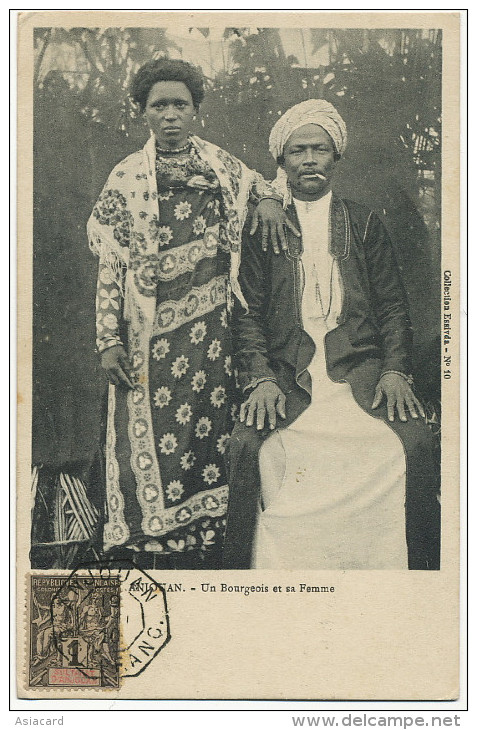my article;
"An African island at the nexus of global trade: The Comoros island of Nzwani from 750-1889AD"
The history of one of the Indian Ocean world's busiest port cities.
isaacsamuel.substack.com/p/an-african-i…

"An African island at the nexus of global trade: The Comoros island of Nzwani from 750-1889AD"
The history of one of the Indian Ocean world's busiest port cities.
isaacsamuel.substack.com/p/an-african-i…


In the 17th century, a small island off the coast of East Africa became a cosmopolitan locus of economic and cultural interchanges in the Indian ocean world that stitched together the continents of Africa, Asia, Europe, and the Americas.
isaacsamuel.substack.com/p/an-african-i…
isaacsamuel.substack.com/p/an-african-i…
Nzwani forged economic and political alliances with distant maritime empires through strategies of similitude, enabling it to grow its economy and emerge as one of the most important port cities in the Indian ocean
isaacsamuel.substack.com/p/an-african-i…
isaacsamuel.substack.com/p/an-african-i…
Nzwani was primarily settled by groups of Comorian speakers from mainland east Africa, settlements of daub & coral construction were established at Sima and Domoni
thru maritime trade, they adopted Islam,
Domoni's rulers conquered Sima and set up a state.
isaacsamuel.substack.com/p/an-african-i…

thru maritime trade, they adopted Islam,
Domoni's rulers conquered Sima and set up a state.
isaacsamuel.substack.com/p/an-african-i…


The classical period of Nzwani's history begins in the 15th century with the emergence of centralized institutions, an elaborate social hierarchy and the flourishing of a large agro-pastoral economy supplemented by maritime trade
isaacsamuel.substack.com/p/an-african-i…
isaacsamuel.substack.com/p/an-african-i…
Like the Swahili, the Comorian rulers of 15th cent. Nzwani claimed superficial lineages to legitimize their authority, affirmed thru intermarriage with the former
in 1503, Vasco da Gama passed by Grande Comore, but over the century, Nzwani was preferred
isaacsamuel.substack.com/p/an-african-i…

in 1503, Vasco da Gama passed by Grande Comore, but over the century, Nzwani was preferred
isaacsamuel.substack.com/p/an-african-i…


the Mutsamudu harbour soon became the preferred stop-over for European ships entering the Indian ocean, prompting the rulers of Nzwani to gradually moved their capital.
demand for provisions increased their power which they extended over the entire Island
isaacsamuel.substack.com/p/an-african-i…
demand for provisions increased their power which they extended over the entire Island
isaacsamuel.substack.com/p/an-african-i…
more than 90% of 400 English ships that sailed into the Indian ocean from 1601 to 1834 stopped at Nzwani
over 55% had sailed directly from England without a stop-over
Nzwani's trade was well organized and its own merchants sailed across the Indian ocean
isaacsamuel.substack.com/p/an-african-i…

over 55% had sailed directly from England without a stop-over
Nzwani's trade was well organized and its own merchants sailed across the Indian ocean
isaacsamuel.substack.com/p/an-african-i…


Nzwani's population exceeded 25,000 by the 18th cent.
Unlike their East African peers, Nzwani merchants frequently sailed the Indian ocean and possessed extensive nautical knowledge
their circular trade took them to India, Yemen, Mozambique and Madagascar
isaacsamuel.substack.com/p/an-african-i…
Unlike their East African peers, Nzwani merchants frequently sailed the Indian ocean and possessed extensive nautical knowledge
their circular trade took them to India, Yemen, Mozambique and Madagascar
isaacsamuel.substack.com/p/an-african-i…
Nzwani's strategy of similitude -especially with English traders that called at its port- enabled them to forge commercial alliances which they used for all the economic, political, and military benefits that they could acquire
isaacsamuel.substack.com/p/an-african-i…
isaacsamuel.substack.com/p/an-african-i…

By playing on sentiments of reciprocity and camaraderie, Nzwani's rulers leveraged foreign military assistance in local conflicts especially when faced with threats of invasion
they constructed a large fort armed with cannons bought from the English
isaacsamuel.substack.com/p/an-african-i…
they constructed a large fort armed with cannons bought from the English
isaacsamuel.substack.com/p/an-african-i…
internal conflicts in the late 18th century and shifting trade patterns of English ships threatened Nzwani's prominence, but the former were resolved and the latter replaced by the French and American ships
Nzwani retained its place in international trade
isaacsamuel.substack.com/p/an-african-i…

Nzwani retained its place in international trade
isaacsamuel.substack.com/p/an-african-i…


upto 60 US & French ships called at Mutsamudu each year between the years 1852-1858
when Nzwani was faced with French colonial expansion, it counteracted them using the British, setting up sugar refineries in the 1860s that produced 400 tones annually
isaacsamuel.substack.com/p/an-african-i…
when Nzwani was faced with French colonial expansion, it counteracted them using the British, setting up sugar refineries in the 1860s that produced 400 tones annually
isaacsamuel.substack.com/p/an-african-i…
Nzwani's last king Abdallah's tenuous power and shifting international politics, prompted his shift to the French, but a local rebellion gave the latter pretext to annex it.
The maneuverability of Nzwani's elites allowed it to preserve a level of autonomy
isaacsamuel.substack.com/p/an-african-i…
The maneuverability of Nzwani's elites allowed it to preserve a level of autonomy
isaacsamuel.substack.com/p/an-african-i…

• • •
Missing some Tweet in this thread? You can try to
force a refresh








